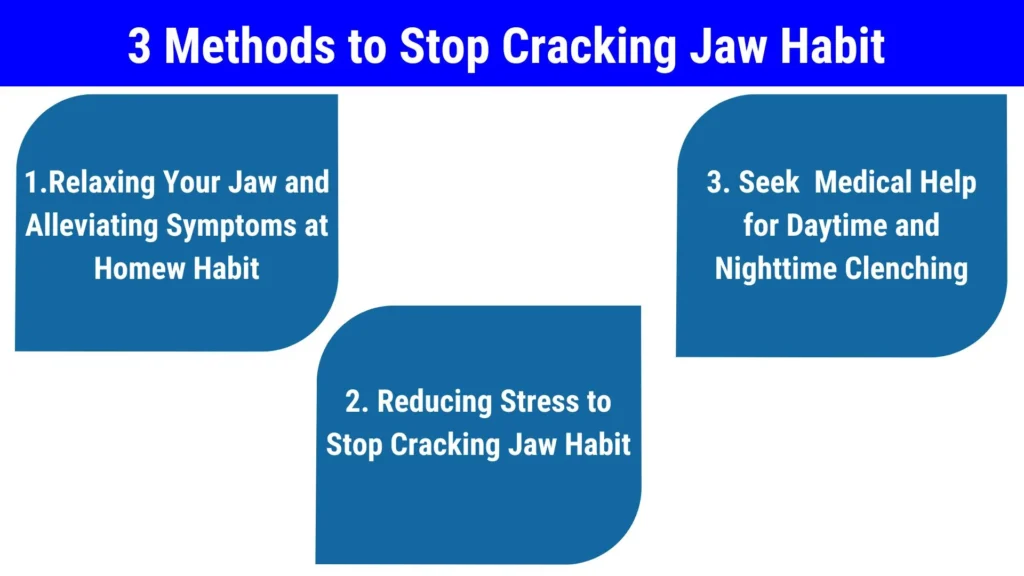Have you ever heard a sudden popping sound when you open your mouth wide or chew? That’s jaw cracking—it can be surprising, a bit unsettling, and often a sign that something isn’t quite right with your jaw.
But why do people start cracking their jaws in the first place? Some do it to relieve stress, like how some people bite their nails or tap their fingers. It is essential to stop cracking the jaw habit. When it becomes a repetitive habit, almost automatic, especially when feeling anxious or bored.
Sometimes, jaw cracking isn’t just a habit. It could be because of an underlying issue, like the way your jaw is aligned, or a condition called temporomandibular joint disorder. Stress can also play a role, causing you to clench your teeth, which might lead to jaw discomfort or that popping sound.
Table of Contents
Symptoms of Cracking Jaw Habit
Here are the main symptoms of jaw cracking.
- Audible Popping or Clicking Sound: When you open or close your mouth, you might hear a distinct popping or clicking sound coming from your jaw joint.
- Jaw Pain or Discomfort: You may experience pain or tenderness in the jaw area, which could be a sign of strain or underlying issues.
- Difficulty in Opening or Closing the Mouth: If you find it hard to open or close your mouth fully, it could be related to the cracking sensation.
- Locking Jaw: In some cases, the jaw may temporarily lock or get stuck in a certain position, making it hard to move.
- Headaches or Earaches: Jaw issues can sometimes lead to headaches or earaches, as the jaw joint is closely connected to these areas.
- Grinding or Clenching Teeth: This can be both a cause and a symptom of jaw cracking, especially if you notice it happening at night or during times of stress.
These symptoms can indicate a jaw problem that might lead to or be caused by jaw cracking.
How to Stop Cracking Jaw Habit?
There are three methods to stop cracking the jaw habit.

1. Relaxing Your Jaw and Alleviating Symptoms at Home
If you’re looking to stop the habit of cracking your jaw, the first step is to take good care of your jaw at home. Here are some simple methods that can help you relax your jaw and ease any discomfort.
I. Use Warm Compress on Your Jaw
A warm compress can work wonders when your jaw feels tight or sore. Just soak a cloth in warm water, wring it out, and place it on your jaw where it meets your skull. The warmth helps to relax the muscles and increase blood flow, reducing stiffness and easing the urge to crack your jaw.
II. Gently Massage your Jaw Joints
Massaging your jaw is another effective way to relieve tension. Use your fingers to gently rub the area around your jaw joints in circular motions. Start at the temples and work your way down to the jawline. This massage can help release built-up stress and reduce pain, making it easier to resist the habit of jaw cracking.
III. Practice Proper Jaw alignment
Keeping your jaw in a relaxed position can prevent unnecessary strain. To do this, make sure your teeth are slightly apart when your mouth is closed, and your tongue rests gently against the roof of your mouth. Avoid clenching your teeth or pressing your tongue hard against your teeth, as these habits can increase tension and lead to jaw cracking.
IV. Perform jaw-stretching Exercises
Jaw exercises can help strengthen the muscles around your jaw, improve flexibility, and stop the popping jaw habit. A simple exercise is to open and close your mouth slowly, making sure your jaw moves smoothly. Another exercise is to move your jaw side to side gently without forcing it. These exercises can help reduce stiffness and make your jaw less prone to cracking.
V. Limit Caffeine and Avoid Crunchy Food
Caffeine can increase muscle tension, so try to cut back on coffee, tea, and energy drinks. Also, avoid crunchy or hard foods like chips, nuts, or tough meats, which can put extra stress on your jaw. Instead, choose softer foods that are easier to chew.
VI. Increases your Intake of Essential Nutrients
Your jaw health can benefit from a balanced diet rich in minerals and vitamins. Focus on foods that ensure high calcium, magnesium, and vitamins C and D. These nutrients help keep your bones and muscles strong. This can help you stop the popping jaw habit and make it easier to maintain a relaxed jaw position.
2. Reducing Stress to Stop Cracking Jaw Habit
Stress is a major reason why many people crack their jaws. According to bend headache center, by reducing stress, you can also reduce the urge to crack your jaw. Here are some steps you can take to lower stress and improve your jaw health.
I. Identify and Avoid Stress Triggers
The first step in reducing stress is to understand what makes you feel stressed. It could be a hectic work environment, a tense relationship, or even something as simple as traffic jams. Take note of what stresses you out, and try to avoid those triggers when possible.
If avoiding them isn’t possible, think about ways to minimize their impact—like planning your day better or setting boundaries at work.
II. Prioritize Getting Enough Sleep
Getting quality sleep is essential to reduce stress and break the jaw-cracking habit. Start by creating a calming bedtime routine with relaxing activities like reading or listening to soft music. Aim to go to bed and wake up at the same time each day to maintain a consistent sleep schedule.
Your sleep environment matters, so keep your bedroom cool, quiet, and dark, and avoid stimulants like caffeine in the evening. To manage stress, try relaxation techniques such as deep breathing or meditation before bed. With better sleep, you’ll feel more relaxed and less inclined to crack your jaw.
III. Engage in Regular Aerobic Workout
Exercise is a great way to blow off steam and release stress. It doesn’t have to be intense—just a simple walk, jog, or bike ride can make a big difference. Aerobic exercise helps release endorphins, which are natural stress relievers. Plus, it keeps you healthy and active, which can also improve your mood and reduce anxiety.
IV. Seek Professional Help for Anxiety and Stress
Sometimes, stress can be too much to handle on your own. If you find that stress is overwhelming and affecting your daily life, consider talking to a therapist or counselor. They can help you work through your stress and provide tools to manage it.
In some cases, medication might be recommended to help control chronic anxiety. It’s okay to seek professional help when you need it—your mental health is important, and managing stress can make a big difference in breaking the habit of jaw cracking.
3. Seek Medical Help for Daytime and Nighttime Clenching
If you’re struggling with jaw clenching during the day or night, seeking medical help can be an important step in breaking the habit. Here are some approaches that can help address this issue.
I. Visit Your Dentist for a consultation
Your dentist is often the best person to talk to about jaw clenching and how to stop popping jaw habit. They can check for signs of wear on your teeth and evaluate your jaw’s health. A dentist can also suggest specific treatments to help reduce clenching and cracking, like custom mouthguards or exercises.
II. Consider Getting Dental Splints
Dental splints are devices that fit over your teeth and help protect them from damage caused by clenching or grinding. They also reduce the pressure on your jaw joints, which can lessen the urge to crack your jaw.
Splints can be worn at night to prevent teeth grinding or during the day to keep your jaw in a more relaxed position.
III. Explore Biofeedback Techniques for Jaw Relaxation
Biofeedback is a technique that helps you become more aware of your body’s stress responses. In the case of jaw clenching habit, biofeedback can teach you to recognize when you’re clenching and how to relax your jaw muscles.
A therapist uses sensors to track your muscle activity, giving you real-time feedback to help you learn to control it.
IV. Try Acupuncture for Jaw Tension Relief
Acupuncture involves inserting thin needles into specific points on your body to reduce pain and promote relaxation. Some people find that acupuncture helps relieve jaw pain and tension, making it easier to stop jaw popping, clenching, and cracking. If you’re curious about this alternative therapy, consult a licensed acupuncturist for guidance.
V. Discuss Muscle Relaxants with Your Doctor
If your jaw-cracking habit is severe, your doctor might recommend muscle relaxants. These medications help relax tight muscles, reducing the pressure on your jaw and decreasing the urge to clench or crack it.
Muscle relaxants are typically prescribed for short-term use, so it’s important to follow your doctor’s advice and not self-medicate.
VI. Review Medications for Potential Side Effects
Sometimes, medication you’re already taking can cause side effects like jaw clenching or grinding. If you suspect this might be the case, discuss it with your doctor.
They can review your medications and see if any of them could be contributing to habit of cracking jaw. If so, they might adjust your prescription or suggest an alternative.
These are some of the ways you can seek medical help for jaw popping and cracking. By exploring these options, you can find the best solution to address your specific situation and improve your jaw health.
Conclusion
Why does my jaw pop? The reasons are multiple, but some common among them are stress, anxiety, medical disorders, use of caffeine or other drugs. If you feel any symptoms of jaw cracking, work on the exercises to stop jaw popping and feel better.
In extreme cases of pain and cracking jaw, I suggest consulting a professional doctor, just like in case of excessive blinking habits. Discuss your issue and take medication accordingly.
FAQs
Is jaw cracking always a sign of a problem?
Jaw cracking isn’t always a cause for concern, but if it happens frequently or is accompanied by pain, it could indicate an underlying issue like temporomandibular joint (TMJ) disorder. If you’re worried, it’s best to consult a dentist or a jaw specialist.
Can jaw cracking cause damage?
Yes, repeated jaw cracking can lead to wear and tear on the jaw joint and surrounding tissues. It can also increase the risk of developing TMJ disorder over time, which can cause pain, difficulty chewing, and other complications.
How can I reduce jaw cracking while I sleep?
If you crack or grind your jaw at night, a dental splint or mouth guard can help. These devices protect your teeth and reduce pressure on the jaw joint. Additionally, creating a calming bedtime routine and maintaining a consistent sleep schedule can contribute to better jaw health during sleep.
What foods should I avoid if I have a jaw-cracking habit?
Avoid hard, crunchy, or chewy foods like nuts, chips, or tough meats, as they can put extra stress on your jaw. Stick to softer foods that are easier to chew to reduce the risk of jaw cracking.




